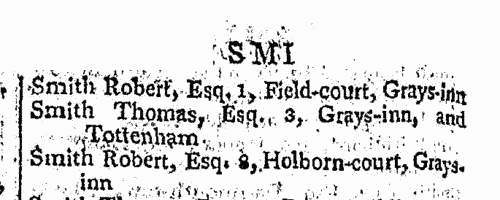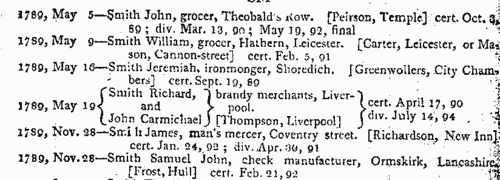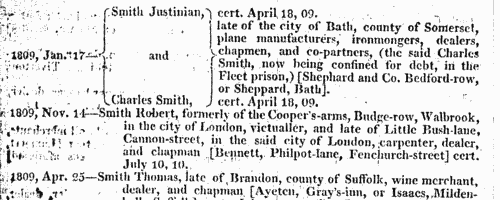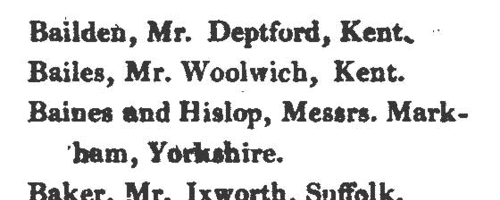M'cullock Surname Ancestry ResultsOur indexes 1800-1900 include entries for the spelling 'm'cullock'. In the period you have requested, we have the following 33 records (displaying 1 to 10): Single Surname Subscription | | | Buying all 33 results of this search individually would cost £174.00. But you can have free access to all 33 records for a year, to view, to save and print, for £100. Save £74.00. More... |
These sample scans are from the original record. You will get scans of the full pages or articles where the surname you searched for has been found. Your web browser may prevent the sample windows from opening; in this case please change your browser settings to allow pop-up windows from this site. British in India and Ceylon
(1804)
Births, marriages and deaths, civil and military promotions, in Bengal, Bombay and Madras presidencies and Ceylon, published in the Annual Asiatic RegisterM'CULLOCK. Cost: £6.00.  | Sample scan, click to enlarge

| Inhabitants of London
(1805)
Holden's Triennial Directory for 1805 to 1807 includes this 'London Alphabet. Private Residences'. About 10,000 people are recorded.M'CULLOCK. Cost: £4.00.  | Sample scan, click to enlarge

| Navy Officials and Clerks
(1805)
Officials of the Admiralty Office at Charing Cross, the Marine Department, the Navy Office at Somerset House, Secretary's Office, Contract Office, Office for Bills of Account, Office for Seamen's Wages, Allotment Office, Surveyor's Office, Office for Examining the Treasurer's Accounts, Ticket Office, Office for Examining Storekeepers' Accounts, Office for Stores and Slops, Deptford, Woolwich, Chatham and Sheerness dockyards, the Navy Pay Office, the Victualling Office in Somerset Place, the High Court of Admiralty at Doctors Commons, and the bona fide Navy Agents, are listed in different sections of Holden's Triennial Directory of 1805 to 1807, and are indexed here.M'CULLOCK. Cost: £8.00.  | Sample scan, click to enlarge

| Bankrupts
(1786-1806)
William Smith's abstracts of bankrupts, dividends and certificates for England and Wales from 1786 to June 1806. Bankruptcy causes abrupt changes in people's lives, and is often the reason for someone appearing suddenly in a different location or in a different occupation.M'CULLOCK. Cost: £4.00.  | Sample scan, click to enlarge

| Subscribers to Felicia Dorothea Browne's Poems
(1808)
Poems, by Felicia Dorothea Browne, published in Liverpool in 1808, attracted a wide subscription list, headed by His Royal Highness the Prince of Wales, His Royal Highness the Duke of Gloucester, and Her Royal Highness the Princess Sophia of Gloucester. Although most of the subscribers were from London or Liverpool, there are many from elsewhere in the country. The names are arranged by initial letter of surname, each letter being headed by the names of nobility; christian names are rare, most surnames being prefixed by Mr., Mrs. or Miss. Many names are given addresses, or at least general locations, in italics. M'CULLOCK. Cost: £4.00.  | Sample scan, click to enlarge

| Bankrupts
(1808-1810)
William Smith's abstracts of bankruptcies for England and Wales from 1 January 1808 to 1 August 1810. Bankruptcy causes abrupt changes in people's lives, and is often the reason for someone appearing suddenly in a different location or in a different occupation.M'CULLOCK. Cost: £4.00.  | Sample scan, click to enlarge

| Deaths, Marriages, News and Promotions
(1815)
Death notices and obituaries, marriage and birth notices, civil and military promotions, clerical preferments and domestic occurrences, as reported in the Gentleman's Magazine. Mostly from England and Wales, but items from Ireland, Scotland and abroad.
M'CULLOCK. Cost: £4.00.  | Sample scan, click to enlarge

| Workers at Mitchell, Hardie & Scott's Cotton Mill, Manchester
(1818)
The minutes of evidence taken before the Lords Committee on the Cotton Factories Bill include a series of reports by medical men as to the general health of the mill workers in April 1818. For each factory there is a complete list of workers, giving full name, age, how long employed in a factory, health (in general terms, such as 'Good' or 'Sickly'), and any chronic disease or 'distortion', cause and duration - with slight variations from report to report. The physicians examined several hundred people each day, asking such questions as 'Have you any swellings or sores anywhere?', 'Are your limbs straight?', 'Have you a good appetite for food?', 'Do you conceive yourself to be in good health?', and all concluded that the health of the mill workers was good, and that the workers were cheerful. This is the report for Mitchell, Hardie and Scott's cotton spinning factory in Manchester, 17 April 1818.M'CULLOCK. Cost: £6.00.  | Sample scan, click to enlarge

| Masters of Merchantmen
(1822)
The Society for the Registry of Shipping was instituted in 1760, and published an annual register and supplement. The annual register consisted of an alphabetical list of ships surveyed for insurance in Britain and Ireland, together with an alphabetical supplement. The society maintained a Registry Office at which alterations and additions were notified, and members delivering their registers when called for had them updated and returned on the following or the ensuing day. Each ship was given a number within each letter of the alphabet: ships' names were not unique, so within each name a ship was identified by the name of the captain or master at the time of the last survey. Then abbreviations indicate the type of vessel (Bg, brig; Bk, barque; Cr, cutter; Dr, dogger; G, galliott; H, hoy; K, ketch; S, ship; Sk, smack; Sp, sloop; Sr, schooner; St, schoot; Sw, snow), and whether sheathed (s) and/or doubled (d) with copper (C) and iron bolts (I B) or over boards (W & C), patent felt (P F), copper fastened (c f), copper bolted (c b), or copper repaired (C rp) sometimes with a date, such as (18)18. The third column, reserved for masters' names, is not particularly wide; with short surnames, an initial will be given; but longer surnames omit the initials, and even longer surnames are abbreviated. It will be borne in mind that these are the names of the masters not (necessarily) in 1822, but at the time of the last survey. Often new masters had been appointed by the time of re-survey, and their names are added in slightly smaller type under the original master's names in the third column. In the fourth column is the tonnage: where there is a blank under the number this indicates that the ship had two decks; more often the letters S D (B) for single deck (with beams); D W for deep waist; S D W single deck with deep waist; B D W single deck with beams and deep waist. Underneath the entry may run references to recent repairs: Cl. clincher built; Drp. damages repaired; grp. good repair; len. lengthened; lrp. large repair; N. (new) B. bottom, D. deck, Kl. keel, Sds. sides or UW. upper-works; rb. rebuilt; rsd. raised; Srprs. some repairs; or trp. thorough repair. In italics, the timber of the ship is described - B. B., black birch; C., cedar; H., hazel; Hk., hackmetack; J., juniper; L. O., live oak; M., mahogany; P., pine; P. P., pitch pine; S., spruce; W. H., witch hazel; W. O., white oak. The fifth column gives the place that the ship was built. For foreign ships this may be as vague as 'Dutch' or 'French'; but nothing in this record specifically indicates the nationality of ship, master or owners, except that an A. under the owner's name indicates that the vessel was American property. The sixth column gives the year of the ship's age; a few were still sailing after 30 or 40 years. The seventh column gives the owner's name, abbreviated in the same way as the master's name. Where the master was the owner, the word Capt. will appear. With vessels owned abroad, the name in this column is sometimes that of the port of origin, not the surname of the owner. Where there has been a change of owner by the time of re-survey, the new name is put underneath in smaller type. The printer sought to avoid confusion by aligning names of ports to the left and surnames to the right, but that leaves longer names doubtful. The eighth column gives the feet of the draught of water when loaded. The ninth column shows the destined voyage for which the survey took place, with the port of survey abbreviated (Be., Belfast; Br., Bristol; Co., Cork; Cs, Cowes; Da., Dartmouth; Du., Dublin; Eh, Exmouth; Ex., Exeter; Fa., Falmouth; Gr., Greenock; Hl, Hull; Hn, Harrington; La., Lancaster; Lh, Leith; Li., Liverpool; Lo., London; Ly., Lynn; Mt., Maryport; Po., Poole; Ph, Portsmouth; Pl., Plymouth; Sc., Star-Cross; Tn., Teignmouth; Tp., Topsham; Wa., Waterford; Wn, Whitehaven; Wo., Workington; Ya., Yarmouth), and the letter C where the vessel was a constant trader between the two ports. The tenth column gives the classification of the vessel (A, first; E, second) and its stores (1, first; 2, second) and the year of survey, e. g. 09 for 1809, or, if surveyed during 1821, the month, e. g. 3 for March. Where the vessel has been re-surveyed, the classification letter and number will be repeated or revised in the final column. The sample scan is from the main list. This is the index to masters in the main list and the supplement.M'CULLOCK. Cost: £6.00.  | Sample scan, click to enlarge

| Apothecaries
(1823)
The membership list of the Associated Apothecaries and Surgeon-Apothecaries of England and Wales lists members alphabetically by surname and christian name, usually giving address. Those marked P. had served the office of President; V. P. as Vice-President. Those marked with an asterisk had previously been upon the General Committee; those with a dagger were on the then present Committee.M'CULLOCK. Cost: £4.00.  | Sample scan, click to enlarge

|
Research your ancestry, family history, genealogy and one-name study by direct access to original records and archives indexed by surname.
|












